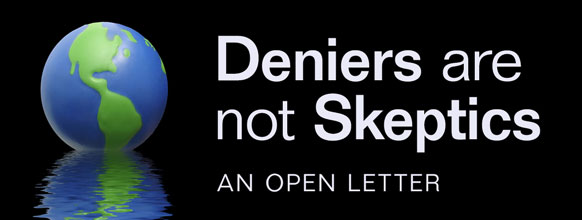Climate change deniers often fancy themselves “skeptics.” For those of us active in movement skepticism, it’s flattering to see others try to ride our coat tails, but it’s also frustrating. Skeptics are known for debunking bogus claims (from ghosts to psychics to the Loch Ness Monster), for operating at the intersection of science and consumer protection, for standing up for the role of evidence and the rational in public discourse. Skepticism means something specific, and deniers just do not do the things that a skeptic does.
That’s what makes it so gratifying that dozens of the leaders of the skeptical movement joined together to state clearly: “Deniers are not skeptics.”  The statement was signed by 48 Fellows of the Committee for Skeptical Inquiry, one of the leading voices in the skeptic movement. It pulls no punches:
The statement was signed by 48 Fellows of the Committee for Skeptical Inquiry, one of the leading voices in the skeptic movement. It pulls no punches:
Proper skepticism promotes scientific inquiry, critical investigation, and the use of reason in examining controversial and extraordinary claims. It is foundational to the scientific method. Denial, on the other hand, is the a priori rejection of ideas without objective consideration.
As scientific skeptics, we are well aware of political efforts to undermine climate science by those who deny reality but do not engage in scientific research or consider evidence that their deeply held opinions are wrong. The most appropriate word to describe the behavior of those individuals is “denial.” Not all individuals who call themselves climate change skeptics are deniers. But virtually all deniers have falsely branded themselves as skeptics.
The statement is pointed especially at journalists, asking them to use accurate terminology:
By perpetrating this misnomer, journalists have granted undeserved credibility to those who reject science and scientific inquiry.
We are skeptics who have devoted much of our careers to practicing and promoting scientific skepticism. We ask that journalists use more care when reporting on those who reject climate science, and hold to the principles of truth in labeling. Please stop using the word “skeptic” to describe deniers.
One of the ways deniers have managed to avoid being labeled accurately has been through aggressive (and, needless to say, inaccurate) attacks on the term “denier.” By making that term seem controversial, they made the term “skeptic” seem like a safe alternative for the press, pollsters, and others seeking to stay above the fray. But with the real skeptics defending their own identity vigorously, these Potemkin skeptics may finally get the name they’ve so richly earned (and which our house style insists upon).
The list of signers on the CSI statement includes NCSE board member Barbara Forrest, several members of our Advisory Council (including Bill Nye, NASA’s David Morrison, Brown’s Ken Miller, and conjuror James Randi), as well as NCSE’s founding executive director (now chair of the Advisory Council) Genie Scott. She told me why this was so important to her:
“The term “skeptic” has for several decades meant someone who applies critical thinking and who demands extraordinary evidence for extraordinary claims, as Carl Sagan put it. When topics like evolution, vaccination, and anthropogenic climate change have withstood the rigors of extensive scientific testing, it is extraordinary indeed to dismiss that wealth of good evidence. People who do that are not skeptics, but deniers of the scientific consensus.
This latest response from skeptics is the most organized effort to challenge deniers’ claim on the term “skeptic,” but hardly the first time the issue has been raised. Historian Spencer Weart, who wrote the definitive history of climate change science, chronicled (in a 2011 paper) “how skepticism became denial”:
Every novel scientific idea must scale a wall of skepticism. First it must overcome the resistance of scientists who found the older ideas plausible. Changing the consensus of the experts is only a beginning, however; the public has yet to be convinced. That may never be completed if the new idea contradicts widely cherished assumptions about the natural world. There is yet another barrier if the idea seems to attack established interests such as a religion or an industry. Then doubt is reinforced by denial: concerted efforts to represent the scientific consensus as false. Nothing shows this process so clearly as the history of the idea that human emissions of greenhouse gases must inevitably produce a global warming.
He describes the perfectly reasonable doubts and challenges offered by many scientists to ideas proposed by Arrhenius in the late 19th century and on through the 1980s, but concludes that by the 1990s:
the self-styled skeptics were not proceeding in a normal scientific manner. Scientists continually test their beliefs, seeking out all possible contrary arguments and evidence, and finally publish their findings in peer-reviewed journals, where further attempts at refutation are encouraged. But the small group of scientists who opposed the consensus on warming proceeded in the manner of lawyers, considering nothing that would not bolster their case, and publishing mostly in pamphlets, books, and newspapers supported by conservative interests. At some point they were no longer skeptics—people who would try to see every side of a case—but deniers, that is, people whose only interest was in casting doubt upon what other scientists agreed was true.
Real skeptics, scientists, and historians all know that climate change denial isn’t skepticism. Now journalists should know it, too.

